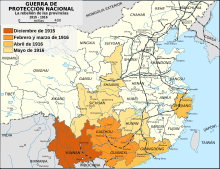
Back Guerra de Protección Nacional Spanish Guerre de protection de la nation French Perang Perlindungan Nasional ID Guerra di protezione nazionale Italian 護国戦争 Japanese 호국 전쟁 Korean Nationale Beschermingsoorlog Dutch Den nasjonale beskyttelseskrigen NB Guerra de Proteção Nacional Portuguese Война в защиту республики Russian
This article needs additional citations for verification. (July 2018) |
| National Protection War | |||||||
|---|---|---|---|---|---|---|---|
 | |||||||
| |||||||
| Belligerents | |||||||
|
| |||||||
| Commanders and leaders | |||||||
| Strength | |||||||
| 700,000+ | 200,000+ | ||||||
The National Protection War (simplified Chinese: 护国战争; traditional Chinese: 護國戰爭; pinyin: Hù guó zhànzhēng), also known as the Anti-Monarchy War, was a civil war that took place in China between 1915 and 1916. Following the overthrow of the Qing dynasty three years previously, the Republic of China was established in its place. The war was caused by President Yuan Shikai's proclamation of the Empire of China, with himself as the Hongxian Emperor.
In Yunnan, military leaders, including Tang Jiyao, Cai E and Li Liejun, declared their independence and launched military expeditions against Yuan Shikai. Yuan's Beiyang Army experienced several defeats and fractured, which led other provinces in the south to declare independence as well. Eventually, under immense pressure from the entire nation, Yuan Shikai was forced to abdicate. He resumed his rule as president and died a few months later.